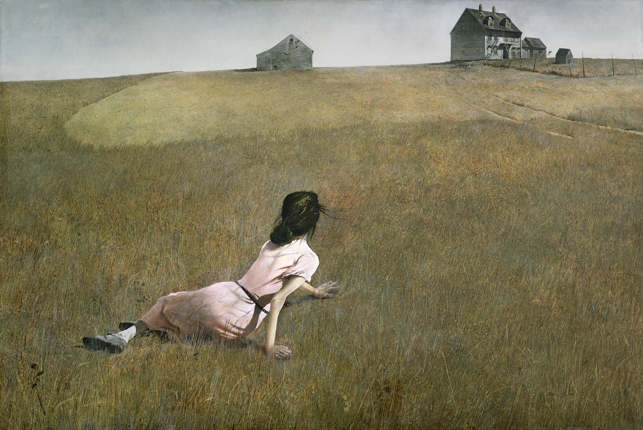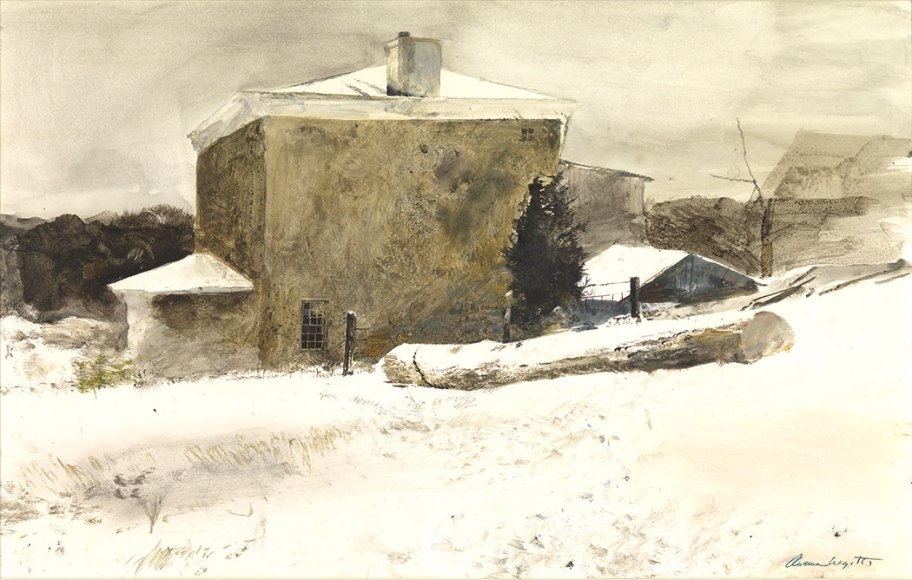January 16, 2020 - February 22, 202
Forum Gallery, 475 Park Avenue at 57th Street, New York, NY 10022
From January 16 to February 22, 2020, Forum Gallery, New York,
presents an exhibition of works by Andrew Wyeth (1917-2009), who set the
standard for American figurative art in the second half of the
Twentieth Century. Working in pencil, watercolor, egg tempera and his
much-beloved personal medium of drybrush, Wyeth, throughout his life,
was a resolute champion of the universal life force of each person he
chose to paint, and of the unique, difficult, ever-changing rural
American world in which he chose to live. His art was controversial as
it was popular, and he remains one of very few living artists to be
celebrated by important single-person exhibitions at The Metropolitan
Museum of Art in New York (1976) and the National Gallery of Art,
Washington, DC (1987). Andrew Wyeth’s 1966-67 exhibition, at the
Pennsylvania Academy of Fine Art in Philadelphia, the Art Institute of
Chicago and New York’s Whitney Museum of American Art, was one of the
best-attended museum exhibitions in history.
The young Andrew Wyeth grew up in a prominent artistic family. His father, Newell Conyers Wyeth, was an important illustrator and realist painter and a strong, early influence on his fifth child, Andrew. The family lived in Chadds Ford, Pennsylvania (population 3600), in Delaware County about 25 miles southwest of Philadelphia and summered in Cushing, Maine in the rural midcoast area. Andrew, who began by emulating his father, making illustrations, soon eschewed illustration and instead chose the people and familiar landscape of his surroundings as the subjects that would endure throughout his life.
Beginning in about 1940, Andrew Wyeth portrayed his closest neighbors. His iconic Christina’s World, painted at the Olson farm in Maine, depicts Christina Olson, disabled from the waist down, whom Wyeth had seen dragging herself across a Maine field.

Christina’s World (1948), purchased by the Museum of Modern Art, New York, for $1,800., brought Andrew Wyeth to great prominence which continues to this day. But perhaps his most characteristic works of this period and through about 1970 are landscapes that imply personal struggle and depict quintessential American beauty.
Firewood (Study for Groundhog Day) (1959), Riverboat (1963),

and Maine Door (1970), all in the Forum Gallery exhibition, are examples.
The young Andrew Wyeth grew up in a prominent artistic family. His father, Newell Conyers Wyeth, was an important illustrator and realist painter and a strong, early influence on his fifth child, Andrew. The family lived in Chadds Ford, Pennsylvania (population 3600), in Delaware County about 25 miles southwest of Philadelphia and summered in Cushing, Maine in the rural midcoast area. Andrew, who began by emulating his father, making illustrations, soon eschewed illustration and instead chose the people and familiar landscape of his surroundings as the subjects that would endure throughout his life.
Beginning in about 1940, Andrew Wyeth portrayed his closest neighbors. His iconic Christina’s World, painted at the Olson farm in Maine, depicts Christina Olson, disabled from the waist down, whom Wyeth had seen dragging herself across a Maine field.

Christina’s World (1948), purchased by the Museum of Modern Art, New York, for $1,800., brought Andrew Wyeth to great prominence which continues to this day. But perhaps his most characteristic works of this period and through about 1970 are landscapes that imply personal struggle and depict quintessential American beauty.
Firewood (Study for Groundhog Day) (1959), Riverboat (1963),

and Maine Door (1970), all in the Forum Gallery exhibition, are examples.
Although
Andrew Wyeth had begun to paint provocative female nude subjects in
1945, it was in the early 1970’s that he began an extraordinary,
15-year, artist/model relationship with his Pennsylvania neighbor, Helga
Testorf that resulted in more than 240 works, nearly all completed in
secrecy and not shown or exhibited until 1986.
Two of these works,

Letting Her Hair Down (1972)

and In the Orchard (1974)
are in the Forum Gallery exhibition. The Helga paintings were controversial for many reasons, but may well be the most insightful, sensitive and beautiful figurative works Andrew Wyeth completed.
In the 1980’s, Andrew Wyeth produced fully mature and developed landscapes and figure paintings, and the Forum Gallery exhibition includes Anchor Man (1983), The Blonde Study (1985) and Housebound Study (1986).
In the 1990’s, his involvement with his chosen models at an end, Andrew Wyeth returned to his neighboring landscapes as his subjects, imbuing each work with a personal and poetic vision, inspiring the viewer to provide a narrative, an identification with the focus the Artist brought. In Jimmy’s Porch (1991), East Point Lighthouse (1991) and Pickup Sticks (1994), all included in the Forum exhibition, Andrew Wyeth again showed why his unique and highly personal art transcended realism and Americana while incorporating both, and became one of the most celebrated artists of the Century.
Two of these works,

Letting Her Hair Down (1972)

and In the Orchard (1974)
are in the Forum Gallery exhibition. The Helga paintings were controversial for many reasons, but may well be the most insightful, sensitive and beautiful figurative works Andrew Wyeth completed.
In the 1980’s, Andrew Wyeth produced fully mature and developed landscapes and figure paintings, and the Forum Gallery exhibition includes Anchor Man (1983), The Blonde Study (1985) and Housebound Study (1986).
In the 1990’s, his involvement with his chosen models at an end, Andrew Wyeth returned to his neighboring landscapes as his subjects, imbuing each work with a personal and poetic vision, inspiring the viewer to provide a narrative, an identification with the focus the Artist brought. In Jimmy’s Porch (1991), East Point Lighthouse (1991) and Pickup Sticks (1994), all included in the Forum exhibition, Andrew Wyeth again showed why his unique and highly personal art transcended realism and Americana while incorporating both, and became one of the most celebrated artists of the Century.
